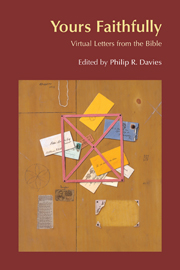Book contents
- Frontmatter
- Contents
- INTRODUCTION: IN PRAISE OF VIRTUAL LETTERS
- 1 Sarah to Abraham
- 2 Isaac to Abraham
- 3 Sarah to Rebekah
- 4 Pharaoh Ramses to Moses
- 5 Aaron to Miriam
- 6 Jephthah's Daughter to her Father
- 7 Samson to Delilah
- 8 Shmuel ben Elkanah to Achish
- 9 Absalom to David
- 10 Salu Father of Zimri to Zur Father of Cozbi
- 11 Ahitophel to Absalom
- 12 Ahitophel to Eliam, his Son
- 13 King Ahab to his Steward Obadiah
- 14 King Ahab to the Writers of the Books of Kings
- 15 Athaliah to Elijah the Tishbite
- 16 The Big Fish to Jonah
- 17 Nineveh to Judah
- 18 Jeremiah to Ezekiel
- 19 Between Zedekiah and Jeremiah
- 20 Haggai to Zechariah
- 21 Zechariah to Haggai
- 22 Esther to her Mother
- 23 John the Baptizer to Jesus
- 24 Jesus to his Mother
- 25 Judas Iscariot to James; James to his Family
- 26 From a Greek Woman of Tyre to Jairus of Galilee
- 27 Pilate's Wife to her Husband
- 28 Publius Philostratus to an Author
- 29 Onesimus to Paul
- 30 ‘Jezebel’ of Thyatira to John of Patmos
- 31 Letter to Bible Authors [Draft]
- List of Authors
25 - Judas Iscariot to James; James to his Family
- Frontmatter
- Contents
- INTRODUCTION: IN PRAISE OF VIRTUAL LETTERS
- 1 Sarah to Abraham
- 2 Isaac to Abraham
- 3 Sarah to Rebekah
- 4 Pharaoh Ramses to Moses
- 5 Aaron to Miriam
- 6 Jephthah's Daughter to her Father
- 7 Samson to Delilah
- 8 Shmuel ben Elkanah to Achish
- 9 Absalom to David
- 10 Salu Father of Zimri to Zur Father of Cozbi
- 11 Ahitophel to Absalom
- 12 Ahitophel to Eliam, his Son
- 13 King Ahab to his Steward Obadiah
- 14 King Ahab to the Writers of the Books of Kings
- 15 Athaliah to Elijah the Tishbite
- 16 The Big Fish to Jonah
- 17 Nineveh to Judah
- 18 Jeremiah to Ezekiel
- 19 Between Zedekiah and Jeremiah
- 20 Haggai to Zechariah
- 21 Zechariah to Haggai
- 22 Esther to her Mother
- 23 John the Baptizer to Jesus
- 24 Jesus to his Mother
- 25 Judas Iscariot to James; James to his Family
- 26 From a Greek Woman of Tyre to Jairus of Galilee
- 27 Pilate's Wife to her Husband
- 28 Publius Philostratus to an Author
- 29 Onesimus to Paul
- 30 ‘Jezebel’ of Thyatira to John of Patmos
- 31 Letter to Bible Authors [Draft]
- List of Authors
Summary
These manuscripts have recently become available because William Klassen, the historian, took what most supposed to be a fictional piece by Jorge Luis Borges as history. His ingenious reading and Klassen's own fictional version of Judas’ suicide note led others, under the leadership of Dan Brown and Rupert Wainwright, to reexamine and publish the collected theological writings of Nils Runeberg. These manuscripts, reprinted here by permission of the De Quincey Foundation, are the most interesting part of that collection. Many paleographers date them to the first century CE. Accordingly, many, notably James Robinson and Burton Mack, claim that they cast new light on the diverse history of early Christianity. By contrast, Norman Jewison and Hyam Maccoby (The Gospel According to Judas), deny their authenticity claiming that they are ‘yet another blatant anti-Semitic attempt to propagate Christian mythology’.
It is significant that Judas never refers to the famous ‘thirty pieces of silver’. Is this omission Judas' attempt to avoid shame? Or, did the Gospels, as many scholars have long contended, manufacture that particular calumny on the basis of obscure Hebrew prophecies? If Judas did take money from the authorities, others could attribute this to greed. But, could Judas have taken money in order to replenish the treasury depleted by Jesus' Jerusalem extravagances? Everyone agrees that Jesus was a wastrel taking no thought for the morrow. If Judas took money to garner support for the continued ministry, he certainly did not intend Jesus' arrest and death. What, then, did he expect?
- Type
- Chapter
- Information
- Yours FaithfullyVirtual Letters from the Bible, pp. 127 - 130Publisher: Acumen PublishingPrint publication year: 2004

